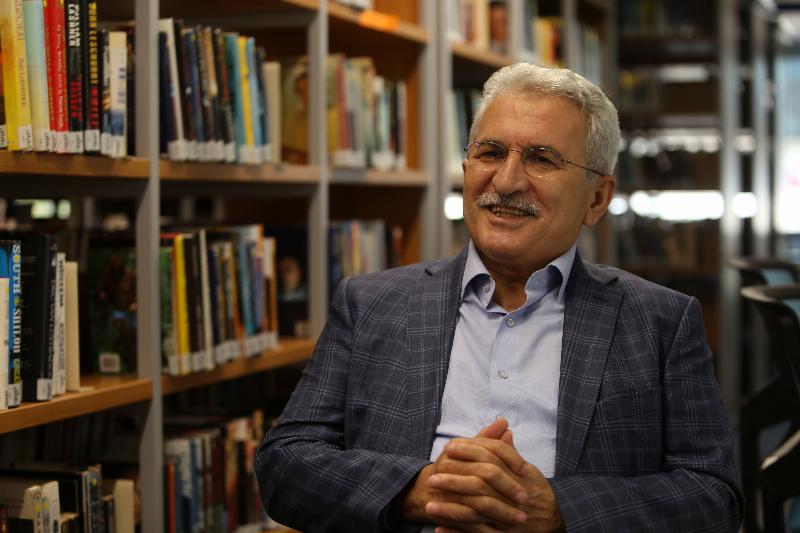Prof. Dr. Ibrahim Ozdemir, Head of Philosophy department at Uskudar University, is part of the core staff preparing the Contract. Disasters caused by Global Warming and Climate Change constantly remain on the world's agenda. Unprecedented flooding in recent days has affected developed countries as well as underdeveloped and developing countries. Hundreds of people have died in Belgium and Germany. Heavy rains affecting China, India, and Sudan also caused material and moral damage in Rize and Arhavi in our country. Scientists and environmentalists around the world are working dilitly to mitigate the effects of climate change and enlighten society on this issue.
Prof. Dr. Ibrahim Ozdemir
“The core team of Muslim environmentalists is working on the document”
A core team of Muslim environmentalists is working on the document Al-Mizan: A Covenant for the Earth. The document will be presented to the United Nations in Autumn. Professor Dr. Ibrahim Ozdemir, Head of the Department of Philosophy of Uskudar University is on the core team preparing the Covenant. It will be presented in detail to all religious leaders and institutions of the Muslim world when the contract is finalized.
The Core Team that is chaired by Faith for Earth and is composed of representatives of the Islamic World Educational, Scientific and Cultural Organization; the Islamic Foundation for Ecology and Environmental Sciences; Uskudar University in Istanbul; the Qur'anic Botanic Garden; and the College of Islamic Studies at Hamad Bin Khalifa University in Qatar.
The Core Team consists of the following Muslim environmentalists:
- Dr. Iyad Abumoghli, the founder and director of the United Nations Environment Programme (UNEP) Faith for Earth Initiative.
- Prof. Dr. Abdelmajid Tribak, The Islamic World Educational, Scientific and Cultural Organization (ICESCO).
- Prof. Dr. Ibrahim Ozdemir, a professor of philosophy at Uskudar University, Istanbul.
- Aishah Ali Abdallah, a wilderness leader and environmental educator who conducts outdoor activities informed by the wildland ethics of Islam.
- Dr. Evren Tok, Associate Professor and Assistant Dean for Innovation and Community Advancement, Program Coordinator for Islam and Global Affairs Program at College of Islamic Studies, Hamad Bin Khalifa University.
- Dr. Fatima Saleh Al-Khulaifi, the Founder of The Qur’anic Botanic Garden, Qatar.
- Sidi Fazlun Khali, a worldwide reputation as a pioneer in the field of Islamic environmentalism having been involved in this work since the 1980s and founder for the Islamic Foundation for Ecology and Environmental Sciences in the UK.
- Kamran Shezad, the Co-Director for the Islamic Foundation for Ecology and Environmental Sciences (IFEES/EcoIslam).
The aim is to provide an Islamic perspective on the environment to strengthen local, regional and international actions to combat climate change and other threats to the planet. It will symbolize a global effort by including Islamic scholars and Muslim institutions in the process to develop and adopt this call.
“A convention that points out that environmentalism is deeply entrenched in the veins of Islam”
Prof. Dr. Ozdemir underlined that “al-Mizan: A Covenant for the Earth consists of a re-expression of the principles governing the protection of nature in a way that meets the current challenges. Emphasis is placed on the moral principles behind the social order of human existence. By working in harmony with the heartbeat of the natural world created by Allah and entrusted to us to protect it, we are exploring how it can be brought to life today. There is a call for a sustainable development concept in line with the basic principles of the Qur'an. Moreover, al-Mizan articulates that environmentalism is deeply embedded in the veins of Islam. Therefore, it emphasizes respect, protection, and responsibility in our relationship with others and the rest of creation.”
“The contract takes its name from “Al-Mizan", a Quranic concept”
Al-Mizan means literally means “of estimate, measure, weigh something”. Prof. Dr. Ozdemir underlined that "the basic principles emphasized by the Qur'an have changed from the foundations established by our beloved Prophet (PBUH) to a series of rules and institutions that exhibit a truly holistic expression of life. These basic values, which are based on the Qur'an; can be divided into three categories: promoting the public interest, avoiding evil, and always acting in moderation. The basic principle that motivates Muslim environmentalists is this verse of the Qur'an:
“Let there be a community among you that calls for what is good, urges what is right and forbids what is wrong, they are the ones who have success” (3: 104)
The Qur'an is often used to explain how cosmological creation is created with a perfect balance; stressing that social balance and justice should also be built on these universal principles:
"The Most Merciful,
Taught the Quran
Created Humankind
Taught him Eloquence
The sun and the moon move in precise calculation
and the stars and the trees prostrate
and the heaven He raised and imposed the balance (Mizan)
That you do not transgress within the balance (Mizan)
and establish weight injustice and do not make deficient the balance (Mizan)”
(Quran 55:1-9)
Prof. Dr. Ozdemir concluded that; It is our greatest wish that Al-Mizan: A Covenant for the Earth to be a new milestone of environmental awareness in the Muslim Ummah.
Although we cannot change the laws of nature, we can change our broken economy, consumption patterns, and our unsustainable lifestyles.
We can learn how to live a sustainable life that is meeting our needs without compromising the ability of future generations to do the same for themselves.
We have to respect the rights of future generations with a spirit of moral responsibility.
The link of al-Mizan: A Covenant for the Earth: https://www.unep.org/al-mizan-covenant-earth


